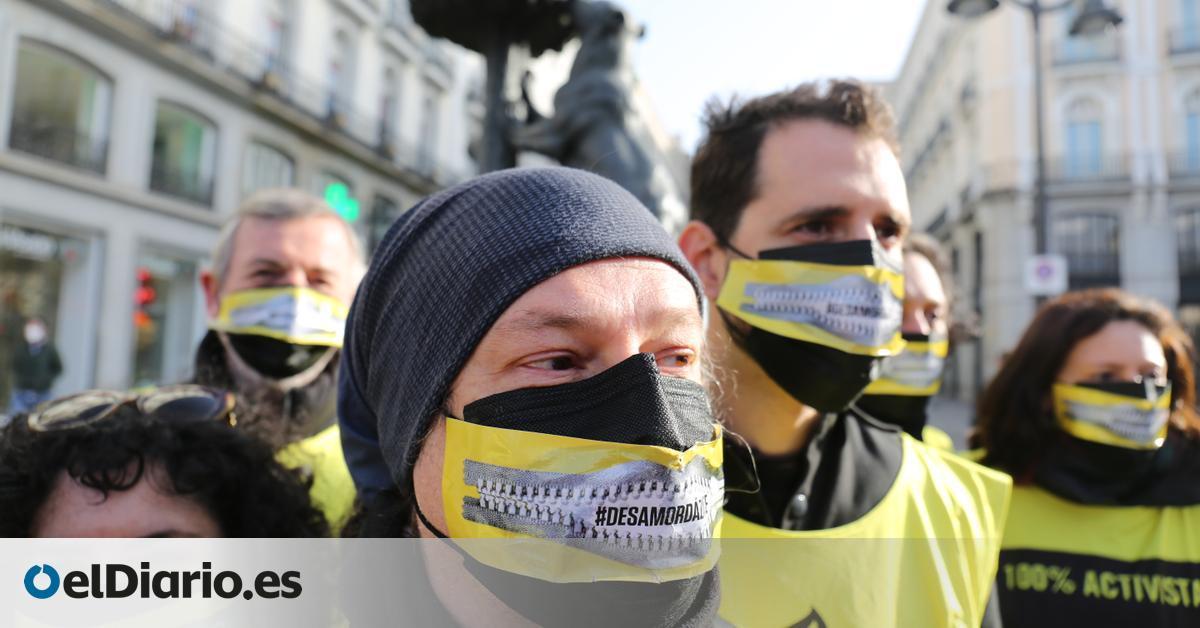
The Government considers the reform of the gag law to be dead. After five years of a left-wing parliamentary majority and except for surprise, the Citizen Security Law, promoted by the Executive of Mariano Rajoy in the face of enormous social response, will survive the legislature of Pedro Sánchez intact. Its repeal came to be reflected as one of the commitments of the progressive coalition government which, however, has shown itself incapable of agreeing with the parliamentary allies on the reform. Its repeal was not possible during the first years of Sánchez’s term, whose government resorted to the norm to punish breaches of the states of alarm decreed during the pandemic and the sources consulted doubt that it can be done in the remainder of the legislature. In the background, the massive protests by the Police and Civil Guard, a determining factor in the opinion of some of the PSOE partners.
The battle of a retiree to knock down a fine for the ‘gag law’: “It must be repealed because it is pure repression”
Further
From the Interior they deny that the blockade of the reform is in any way related to the pressure of important sectors of the State Security Forces that, in fact, they believe to be unjustified. But the department of Grande-Marlaska admits three red lines that coincide with some of the main demands of the Police and the Civil Guard and that, to a large extent, have made it impossible to reach an agreement in Congress: the returns of migrants at the border ( those known as hot returns), the presumption of veracity of the agents and the riot gear.
The parliamentary commission in charge of the work for the reform came to raise the possibility of transferring the issue of hot returns to a future reform of the migration law in order to avoid the clash between the progressive majority, but the other two red lines of the Ministry of the Interior are unaffordable for the government’s allies.
From the Marlaska team they defend that limiting the presumption of truthfulness of the Police and Civil Guard would mean, in practice, generating legal security problems in the day-to-day life of hundreds of agents. And they also support the usefulness of using rubber bullets as riot control material, arguing that alternatives such as FOAM bullets can even be more dangerous.
In Moncloa they recognize that, of all the pending legislative projects, the gag law is the one with the fewest options to move forward, considering it even more stuck than other stalled laws such as housing. And they assume that it is a lost opportunity after five years of left-wing government and the unanimity that the parties and social groups reached against the text that gave birth to the absolute majority of Mariano Rajoy.
From the outset, most of the police unions and the Civil Guard were against the plans of the coalition of PSOE and Unidas Podemos to repeal the gag law. A malaise also embodied in street demonstrations.
Under the slogan “For a safer Spain!”, the union of the National Police JUPOL and the professional association of the Civil Guard JUCIL, majority in their bodies and close to the postulates of Vox, led the mobilizations, estimating that the reform “Foreseen by the Government and its pro-independence partners, it compromises the tranquility of the Spanish streets in favor of the most violent.”
For months, the majority representation of police and civil guards has fueled hoaxes and manipulations in their manifestos to mobilize the collective against the reform proposed by the Government. Some of the mobilizations were agreed after holding meetings with the leader of the PP, Alberto Núñez Feijóo, at the party headquarters on Génova street in Madrid.
The partners reject a ‘light’ reform
The usual partners of the Government distance themselves from any reform proposal that does not address what they consider to be the most harmful aspects of the law and they do not think of giving a ‘yes’ to a watered-down reform. In EH Bildu they also believe that the position of the PSOE shows that it is hostage to the unions and demonstrations like the one last Sunday. At the end of January, the spokesman for the Basque independentistas, Jon Iñarritu, was already convinced that the Socialists would not agree to modify the aspects that his party considers “most harmful” of the law that the PP approved in 2015.
“We are in an electoral year, a few months from the regional elections and in June there are union elections. The Government and the Ministry are concerned about the rise of the extreme right in these police unions and this is even moving the axis of centrality in other unions that until today were corporate but did not represent ideological extremism and today make gestures in that line”, Iñarritu said in an interview with this newspaper about the pressure from the most extreme sectors of these unions.
In those days, the Government and the partners discussed the details of the law in meetings called ad hoc to unblock the most complicated points. More than 96% of the text that reached the meeting of the Congress Report was agreed upon in the absence of these three or four most controversial points: article 23.4 to prohibit the use of rubber balls; 36.6 on sanctions for disobedience to agents; 37.4 that seeks to eliminate or at least objectify sanctions for disrespect for authority and an additional provision to put an end to hot returns.
Although Esquerra Republicana maintains the same red lines as its Basque partner, that day it signed the text and guaranteed the votes to the Government so that the law could advance in its parliamentary process and reach the Interior Commission, although at all times it clarified that the decision it had the objective of “giving margin” to the negotiations. “Obviously we do not agree on how the text of the gag law reform is currently, because the articles that contemplate 70% of the fines are still alive,” said the Republican speaker Maria Dantas. The party maintains that if these points are not changed, the vote on the law will be against.
This was expressed by the ERC spokesman, Gabriel Rufián, to the Prime Minister, Pedro Sánchez, in a control session of Congress at the beginning of February. “We’ll talk about the ‘gag law’, which also has a lot to do with it,” he told her during an exchange about police officers infiltrating social movements in Catalonia. “There are still things to be closed, but to this day the presentation has already corrected all the aspects that caused the majority rejection of the Chamber and that earned it the description of a gag,” Sánchez replied.
United We Can, which has established itself as a kind of mediator during the extensive processing of this regulation, agrees with the president that the law can no longer be called a ‘gag’. Sources around Enrique Santiago, the UP rapporteur on this law, are committed to exhausting “dialogue until the last moment” in order to bring positions closer, but they defend the “work done so far” and think that a “very reduced number of specific issues” cannot “obscure” the progress of what has been achieved in the talks.
On their way to the Commission, PSOE, Unidas Podemos and PNV – whose initial text has been worked on since it was taken into consideration in Congress in December 2020 – signed a series of amendments to try without much success to bring positions closer to EH Bildu and CKD. The jeltzale formation values these intermediate proposals, especially those that have to do with rubber balls and disrespect, which they believe “can serve to advance.” However, after the movements in February and in view of the confirmation that the positions are irreconcilable for now, the text languishes again in Congress with no sign that one of the most important commitments of the coalition agreement can go ahead before it the legislature ends.
–––––
The value of journalism
elDiario.es is financed by the contributions of 60,000 members who support us. Thanks to them, we can write articles like this one and that all readers – including those who cannot pay – have access to our information. But we ask you to think for a moment about our situation. Unlike other media, we do not shut down our journalism. And that makes it much more difficult for us than for other media to convince readers of the need to pay.
If you get information from elDiario.es and you believe that our journalism is important, and that it is worthwhile for it to exist and reach as many people as possible, support us. Because our work is necessary, and because elDiario.es needs it. Become a member, become a member, of elDiario.es.
Source: www.eldiario.es

